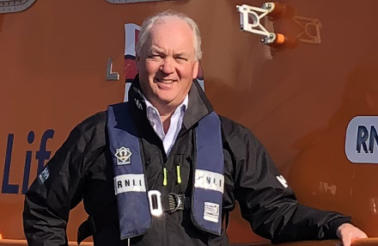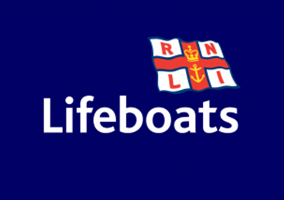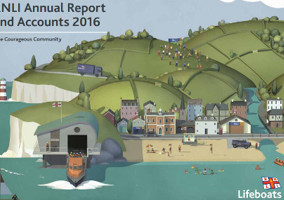Mark Dowie joined RNLI as chief executive in May, having spent two years volunteering as lifeboat operations manager at Salcombe Lifeboat Station, where he was responsible for operational work, training, fundraising and management of the team.
This means he brings first-hand experience of how the charity operates on the ground. He’s also a “long-time sailor and user of the sea for pleasure”, having begun his career as a naval officer.
But he has also held senior roles at Standard Chartered Bank, most recently as chief executive of the corporate and institutional bank, where he led the bank’s global wholesale banking business and was responsible for nearly 20,000 people in 62 countries around the world.
He applied for the role because he thought that bringing together the knowledge he had as a volunteer with his experience from business “would be a wonderful thing to do”.
Dowie describes having that experience from the frontline as a “great privilege”.
In his first few months he says he has met thousands of staff and volunteers, and that it is a “thrilling, fabulous charity”. He has found it to be “a huge family that is joined in one purpose: saving lives at sea”.
‘Challenging financial year’
“First of all we are busier than we have ever been,” Dowie says. Lifeboats were called out 9,000 times last year, which “is a challenge for us because it costs more to run the charity.”
This contributed to RNLI operating at a deficit of £6.3m for the financial year to December 2018.
The main areas of concern are a £8.5m fall in legacy income, and a £10m fall in the value of the charity's investments. It also had to transfer £9m to its pension fund last year.
“Those sorts of numbers need to be dealt with,” he says.
“I have a task and that task is to ensure that we continue to run a world class service in a sustainable way and live within our means.”
‘Not wasting a penny of donor money’
He now plans to review both operational and fundraising activity to see what efficiencies can be made.
“First of all my experience of business tells me that however efficient you think you’re being, there are always ways to operate more efficiently.
“So I will be looking right across the charity to ensure that I can say with real credibility to a potential donor that I’m not wasting a penny of their money.”
At the heart of this is “preserving the service”, and Dowie rules out closing or merging lifeboat stations or making radical changes to the search and rescue service.
“Fundamentally the RNLI is a lifeboat and lifeguard service for the United Kingdom and Ireland, and it will certainly remain that thing,” he says.
But he does not rule out redundancies.
“As you’d expect I’m going to look at every corner of the charity, and that is something that comes with having a fresh perspective,” he says.
“I can use my early time to bring my own knowledge to bear on shining a light into corners,” he adds.
Dowie views this as an ongoing process, rather than having a fixed time-frame in mind, and says it is “a task that will never stop”.
Supporting the branch network
Although a significant chunk of RNLI’s money comes from legacies, Dowie is keen to look at ways to support its branch and shops network.
His wife volunteers at one of its shops and he still helps out with fundraising events in Salcombe.
“All of that effort needs to be supported and made efficient so that supporters are loving what they’re doing and also helping us to raise the funds we need to provide the service.”
Media attention
The fourth series of Saving Lives at Sea began on BBC2 this week.
“That’s important for us because it really brings awareness to a very wide audience of what our volunteers get up to. So it’s a really good opportunity,” he says.
When it comes to dealing with more critical attention from the media, he says he expects to deal with it head on “in a forthright way”.
Looking to the future
RNLI will celebrate its 200th anniversary in 2024.
In some ways things have changed a lot. “We now have a very different level of operational requirement,” he says.
For example, when the Salcombe station opened in 1869, it launched sea rescues twice in its first seven years. Last year it did so 66 times.
Dowie says he is enjoying the job so far and is planning to still be involved when RNLI reaches its big birthday.
“I am absolutely determined that I will see it successfully and sustainably through that, which will be a fantastic year for us. It’s an amazing achievement,” he says.
|
Related articles











